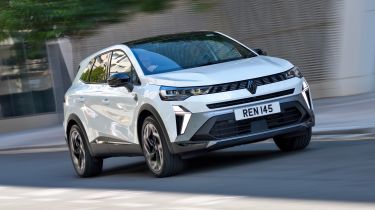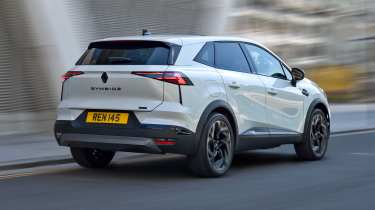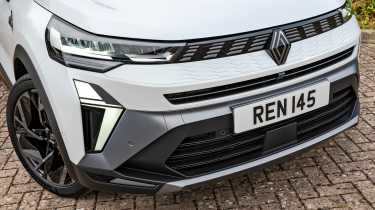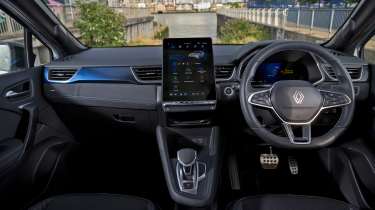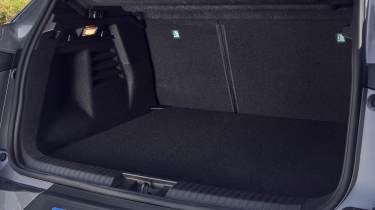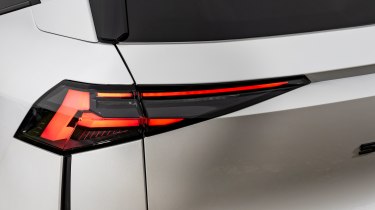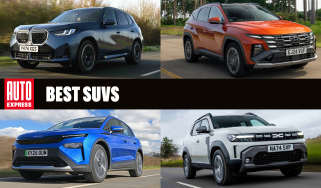Renault Symbioz review
The Renault Symbioz should be a very easy car to live with, and an attractive offering for family buyers

Is the Renault Symbioz a good car?
The Renault Symbioz is everything you need a family car to be: comfortable, practical, efficient and well-equipped. Every version features Renault’s slick E-Tech full-hybrid powertrain that shines brightest around town and encourages drivers to take it easy. Admittedly, the Symbioz doesn’t have the cavernous interior or boot space offered by some of its mid-size SUV rivals, but competitive pricing helps make up for that, and the intuitive Google-powered tech never fails to impress.
| Key specs | |
| Fuel type | Full-hybrid |
| Body style | Mid-size SUV |
| Powertrain | 1.6-litre petrol engine plus electric motor, starter generator and 1.2kWh battery |
| Safety | 4-star Euro NCAP (2024) |
| Warranty | Up to 3-years/60,000 miles |
How much does the Renault Symbioz cost?
‘Voitures à vivre’ means ‘cars for living’, and it’s a philosophy that connects Renault’s most family-focused models, starting with the Renault 16 from 1965, the original Renault Espace of the eighties and the Renault Scenic of the nineties. The latest branch of this curious family tree is the brand-new Renault Symbioz.
It’s looking to knock the Nissan Qashqai off its high horse, and to help do that, every Symbioz features a full-hybrid powertrain as standard. Prices start from £29,295, undercutting the most basic Qashqai by nearly £1,000, and the e-Power hybrid version of that car by more than £5k.
Symbioz buyers have a choice of three trim levels: Techno, Techno Esprit Alpine and Iconic Esprit Alpine. None of them are stingy with the standard kit, as even base models get a 10.4-inch central touchscreen running Renault’s Google-powered OpenR Link infotainment system that comes with apps like Google Maps and Google Assistant built-in. Wireless Apple CarPlay and Android Auto connectivity are also standard, along with a 10.25-inch digital driver’s display, wireless charging pad, keyless entry, adaptive cruise control, a reversing camera, all-round parking sensors, LED headlights and 18-inch alloy wheels.
Upgrading to Techno Esprit Alpine specification (+£2,000) adds a set of 19-inch wheels and jazzes up the interior with French Tricolore stitching, blue gradient dashboard finish and recycled fabric/leather substitute upholstery. Plus, there are heated front seats, a heated steering wheel, a hands-free powered tailgate, blind spot warning and Active Driver Assist, which combines adaptive cruise control and lane centering.
Range-topping Iconic Esprit Alpine models (+£4,000 over base Techno) build on that kit list with luxuries like a nine-speaker Harman Kardon premium sound system, 360-degree parking cameras, hands-free parking tech and a ‘SolarBay’ opacifying panoramic sunroof.
Engines, performance & drive
| Model | Power | 0-62mph | Top speed |
| Renault Symbioz E-Tech hybrid 145 | 143bhp | 10.6 seconds | 106mph |
Think of the Renault Symbioz as a longer version of the Renault Captur compact SUV and you won't go far wrong. The two cars use the same tried-and-tested CMF-B platform – though it’s been stretched slightly for the Symbioz – and are both powered by Renault’s equally familiar ‘E-Tech hybrid 145’ setup.
Under the bonnet is a 1.6-litre four-cylinder petrol engine that works together with one electric motor to drive the front wheels. A separate starter-generator motor helps fire up the engine when needed and recovers the energy it produces to top-up the car’s 1.26kWh battery.
The system’s combined power output is 143bhp, but the e-motor alone can deliver up to 205Nm of torque. And because the Symbioz always starts in EV mode, acceleration away from traffic lights is quite punchy.
The Symbioz is in its element around town, and during our test drive, it often felt like we were driving an electric car because of how little involvement the petrol engine had. The ‘B’ mode for stronger regenerative braking (regen) helps sell this illusion, as it slows the car whenever you lift off the accelerator and keeps the battery topped up. The transitions between petrol and electric power are almost undetectable.
The steering has slightly more weight to it and feels slower than in other Renaults we’ve driven recently, but not so much that it makes manoeuvring the Symbioz around tight car parks or city streets hard work. It helps that the Symbioz is the same width (1,797mm) as the shorter Captur, and has a suitably raised driving position to provide a good view ahead. However, the Symbioz’s rear windscreen is relatively small, and we were disappointed by the quality of the image provided by the rear-view camera.
Escape the city and head towards the motorway, and you’ll find the engine produces a loud drone if you properly put your foot down, but quickly settles down at cruising speeds. The only intrusion we detected was some wind noise around the large side door mirrors. Ride comfort is impressive, even on 19-inch rims, and impacts from potholes were well cushioned.
Find yourself on some twistier roads and the Symbioz can hold its own, but it’s certainly not a sharp or particularly fun car to drive. The family crossover does at least stay composed when cornering, and the blending of regen and physical brakes feels natural.
The only time we felt the Symbioz faltered was when we encountered some steep inclines outside of town with a depleted battery. The engine on its own can't deliver the same oomph as the electric motor, and without assistance, acceleration is noticeably slower. Renault claims that the E-Save function should be utilised for just such a scenario, because it is designed to maintain performance by keeping at least 40 per cent of the battery for use later in your journey. However, we think that'll only be useful if you're very familiar with the route you're taking.
MPG, emissions and running costs
| Model | MPG | CO2 | Insurance group |
| Renault Symbioz E-Tech hybrid 145 | 60.1mpg | 105-107g/km | 16-17 |
You don’t have to worry about charging the hybrid system’s 1.2kWh battery, because that’s all taken care of by the starter generator motor and regenerative braking. The Symbioz also features ‘predictive hybrid driving’ technology that uses data on your route, journey time and traffic from Google Maps to optimise the use of its two power sources. In addition to the clever tech, the Symbioz weighs less than 1,500kg.
All in, Renault says the Symbioz can average up to 60.1mpg. That’s not just talk either, because we managed to achieve an average of 61.4mpg while driving this mid-size SUV on a variety of roads. But based on our experience, we wouldn’t be surprised if that figure climbed to nearer 70mpg if you spend more time driving in town, where the electric motor does most of the work.
Emissions of between 105 and 107g/km mean that the Symbioz will be more affordable to run as a company car than a traditionally powered rival, such as the Skoda Karoq, but electric alternatives such as the Kia Niro EV and Hyundai Kona Electric have an even lower Benefit-in-Kind (BiK) tax bill, and should be less costly to run.
According to our expert depreciation data, the Renault Symbioz holds on to between 51 to 54 per cent of its original value after three years or 36,000 miles. That’s higher than the Skoda Karoq, which maintains between 40 to 44 per cent of its value, but not quite as well as the Kia Sportage, which is expected to be worth between 52 to 59 per cent over the same period.
Design, interior & technology
The Symbioz was designed at exactly the same time as the facelifted Captur, in the knowledge that the purposeful, chunky front end look would be worn by both cars. Both cars embrace Renault’s newest design language that was first seen on the all-electric Renault Scenic E-Tech. These signature elements include the sharp vertical LED strakes, a complex grille pattern, a sculpted bonnet and generally very angular styling.
It’s not all copy and paste, however. The Symbioz gets a unique, more heavily stylised rear end compared to the Captur, plus 3D ‘ice cube’ tail lights and a roof spoiler. New 18 and 19-inch alloy wheel designs are exclusive to the Symbioz, and buyers will have seven paint colours to choose from.
It’s a similar story inside, as the Symbioz uses the same functional interior design as the Captur, making this an easy car to live with. However, it doesn’t offer the same wow factor you get in rivals like the Kia Sportage, or other Renault models like the Renault Megane or Scenic EVs.
Nevertheless, material and build quality are both strong, with plenty of soft-touch materials. All but the base model receive the Esprit Alpine treatment, which adds a few special touches to the cabin, like upholstery made from 26 per cent recycled fabric, and a dashboard panel with a blue gradient effect and textured fabric.
Reserved exclusively for top-of-the-range models is the single-piece Solarbay glass roof. This makes the cabin feel more airy because, rather than using a mechanical blind, the opacity of the glass itself can be changed from fully transparent to fully opaque, or even half-and-half, at the push of a button.
Sat-nav, stereo and infotainment
Every Renault Symbioz features a 10.25-inch customisable digital driver’s display and a 10.4-inch touchscreen that are both sharp and responsive. They’re running the latest version of Renault’s simply excellent OpenR Link infotainment system, which is based on Google’s Android Automotive operating system.
That means the menus are easy to navigate because they’re laid out like those on a smartphone, and services like Google Maps and Google Assistant come built-in. There are 50 additional apps available through the Google Play store too, such as Waze and Spotify, but wireless Apple CarPlay and Android Auto also come as standard if you prefer.
While cabin temperature is displayed on the touchscreen, the Symbioz does feature a bank of physical toggle switches for the climate controls, plus actual buttons on the steering wheel. We also like that the wireless charging pad, which can accommodate even the largest smartphones, is located out of sight under the housing for the gear selector, so you shouldn’t get distracted by any incoming notifications.
Boot space, comfort & practicality
| Dimensions | |
| Length | 4,413mm |
| Width | 1,797mm |
| Height | 1,575mm |
| Number of seats | 5 |
| Boot space | 492-1,582 litres |
When it comes to practicality, the Symbioz isn’t on the same level as the Kia Sportage or a Hyundai Tucson, but it does give the Nissan Qashqai a run for its money.
Even with six-foot tall adults sitting up front, there’s ample legroom for similarly tall rear passengers, who also get headroom to spare and space under the front seats for their feet too. However, the cabin isn’t very wide, and there’s a large hump in the floor eating into foot space, so it would be a tight squeeze getting three adults in the back.
If it’s just young children you’ve got to ferry around, the wide rear door opening will help when installing child seats, and there are two sets of ISOFIX mounting points on the rear bench.
Renault says there’s almost 25 litres of storage space dotted around the cabin. The door bins up front are a decent size, and those in the back are good for a regular-sized water bottle, plus there are nets on the backs of the seats. Rear passengers also get a pair of USB-C charging ports.
Like the smaller Captur, every Symbioz features a sliding rear bench that can be pushed forward by up to 16cm. It’s done by pulling a handle underneath the middle seat, and the process is quick and simple but does require a bit of gusto.
We don’t expect owners will be moving it around all the time, but on the day you’re loading up the car for a family holiday and need just a little space for everyone’s luggage, you’ll appreciate having it.
The Symbioz offers 492 litres of boot space as standard – just shy of the up to 504-litre capacity in the Nissan Qashqai – but that figure expands to 624 litres with the rear seats slid all the way forward. A height-adjustable boot floor is also standard fit, and the rear bench folds down 60:40, giving you 1,582 litres of space to play with.
Safety & reliability
| Key standard safety features | Euro NCAP safety ratings |
|
|
The Symbioz only achieved a four-star out of five safety rating from experts Euro NCAP for several reasons. The Symbioz doesn’t include a child presence detection system for passengers in the rear, a warning that helps to prevent you from opening doors into the path of approaching vehicles (like bicycles), or a centre airbag between the front occupants to prevent them from colliding in a side impact. There were also concerns about poor chest protection for the driver in the front impact. The result is superior to the three-star Dacia Duster, but not as good as the five-star score for the Toyota C-HR.
Plenty of driver assistance systems are provided as standard to prevent you from getting into a collision in the first place. Up to 24 advanced driver assistance systems are available on the Renault Symbioz, including ‘Active Driver Assist’ which offers Level 2 autonomous driving capabilities by combining adaptive cruise control with stop and go function, lane centering and traffic sign recognition. The car can even move over slightly to one side of a lane to give more room for approaching motorcycles.
Rear automatic emergency braking, blind-spot warning, lane-departure warning and driver attention alert are among the other safety systems on offer. The only features reserved for the very top-spec models are a 360-degree parking camera setup and handsfree parking.
However, Renault knows that some drivers don’t want all these features active all the time. So instead of forcing them to dig through the touchscreen every time they switch the car on, the Symbioz features a ‘My Safety’ button on the dashboard that, with just two quick presses, activates a personalised mode for the ADAS suite. Drivers can decide if they want a function on, to what level, and if they want audible alerts. It’s a simple solution that makes life so much easier, and frankly we wouldn’t be surprised if other companies pinch the idea.
The Symbioz also gets a ‘Safety Coach’ that gives you advice on how to drive more safely in real-time and a score out of 100. It’ll even tell you to maintain more distance between the car in front, or to be more attentive, if necessary. But during our test drive we never received any nannying from the system.
Renault Symbioz alternatives
The Renault Symbioz’s biggest rival is the Nissan Qashqai – the archetypal family SUV. But while the Symbioz offers similar levels of practicality, it has been priced in a way that undercuts its foe by a significant margin.
Other alternatives to the Renault Symbioz include big-sellers like the Skoda Karoq and Kia Sportage. Based on its size and price, the Symbioz also has to contend with some of the more practical small SUVs out there, particularly the Kia Niro and, our 2023 Car of the Year, the Hyundai Kona.
Frequently Asked Questions
The Renault Symbioz is a good family-focused SUV that offers appealing value for money, thanks to strong practicality and the slick E-Tech hybrid powertrain that comes as standard.
More reviews
In-depth reviews
Which Is Best
Most Economical
- Name1.6 E-Tech FHEV 145 Techno Esprit Alpine 5dr Auto
- Gearbox typeSemi-auto
- RRP£31,290

